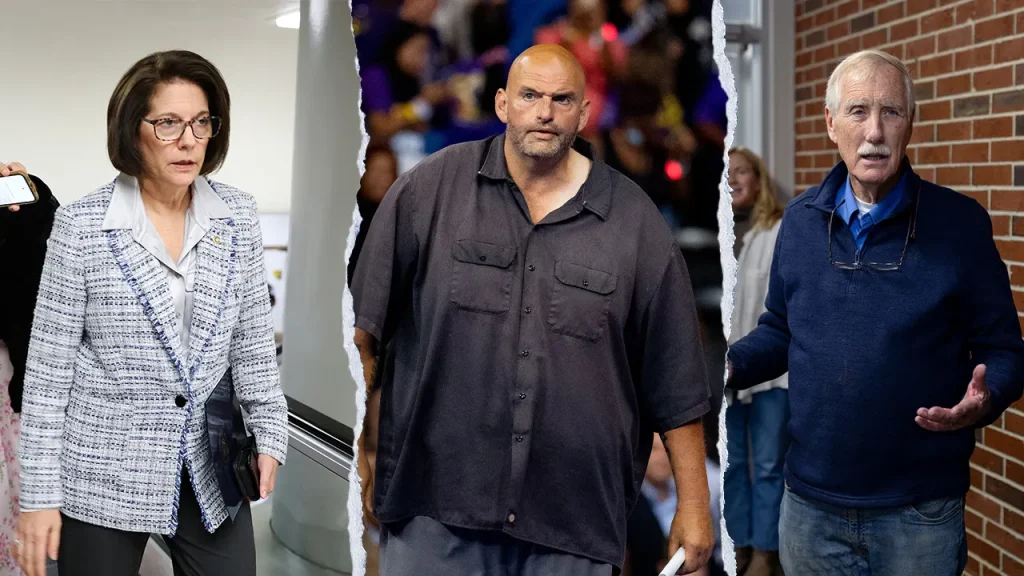Breaking Ranks: Three Senators Face Backlash for Supporting GOP Spending Bill
In a surprising move that highlights the growing tensions within Congress as a potential government shutdown looms, three senators broke with their party lines Tuesday night to support a Republican spending bill. Democratic Senators Catherine Cortez Masto of Nevada and John Fetterman of Pennsylvania, along with Independent Angus King of Maine, voted in favor of the GOP’s continuing resolution aimed at keeping the government open. Their decision has ignited criticism from fellow Democrats who remain united in opposition to the bill, which they claim fails to extend critical Obamacare subsidies, potentially increasing healthcare costs for millions of Americans. This political drama unfolds against the backdrop of intense partisan debates about government funding and policy priorities, with the shadow of former President Trump’s influence hovering over Republican strategies.
For Senator Cortez Masto, the decision came down to protecting her constituents from the harmful impacts of a government shutdown. “This administration doesn’t care about Nevadans, but I do,” she stated firmly after casting her vote. “That’s why I cannot support a costly shutdown that would hurt Nevada families and hand even more power to this reckless administration.” While acknowledging the need for a bipartisan solution to address what she called an “impending health care crisis,” she emphasized that lawmakers shouldn’t be “swapping the pain of one group of Americans for another.” Following her controversial vote, Cortez Masto has reportedly been working the phones, reaching out to colleagues on both sides of the aisle in hopes of finding common ground that could prevent a shutdown while addressing key concerns.
Senator Fetterman’s explanation was equally passionate but more succinct: “I voted AYE to extend ACA tax credits because I support them—but I won’t vote for the chaos of shuttering our government. My vote was for our country over my party.” His statement reflects a growing sentiment among some moderate lawmakers that partisan loyalty should take a backseat to preventing government disruption, especially at a time when economic challenges already face many Americans. Fetterman’s position highlights the difficult balancing act facing legislators who support certain policy positions but worry about the collateral damage that could come from legislative gridlock and government closure.
For Maine’s Independent Senator King, the decision represented “one of the most difficult votes” of his career. King framed his support for the GOP bill as a strategic move to prevent giving former President Trump more influence over government operations. “The irony, the paradox is, by shutting the government we are actually giving Donald Trump and Russell Vought, and Stephen Miller additional power to decimate the federal government,” King explained in a video posted to social media after the vote. His concerns reflect anxiety among some lawmakers about how a shutdown might be exploited by Trump, who has reportedly hinted at using such a crisis as leverage for deeper government cuts. King’s position illustrates how the specter of Trump continues to influence congressional decision-making, even among those not directly aligned with either major party.
The defections have not gone unnoticed or uncriticized within Democratic ranks. New York Representative Dan Goldman publicly expressed being “very upset” to see his Senate colleagues “already caving” to Republicans, contrasting their positions with what he described as a “very united” Democratic front in the House against the Trump-backed GOP appropriations package. This criticism highlights the internal tensions within the Democratic Party about how firmly to hold the line in negotiations with Republicans. Senate Majority Leader Chuck Schumer, who previously supported a similar GOP spending bill in March along with nine other Democratic senators, has shifted his position and now opposes the current Republican proposal. When asked about the defections within his party, Schumer did not provide a comment, leaving questions about how he plans to maintain party discipline as negotiations continue.
Republicans, meanwhile, have seized on these defections as evidence of weakening Democratic unity and Schumer’s diminishing influence within his own party. With the GOP needing a total of eight Democrats to cross the aisle for their continuing resolution to pass, these three votes represent significant progress toward their goal. However, the path forward remains unclear as both parties continue to engage in what many observers have dubbed a “blame game,” with Republicans spotlighting a potential “Schumer shutdown” while Democrats criticize their counterparts for refusing to extend healthcare subsidies. This political maneuvering comes as Americans face the real possibility of government services being disrupted and federal workers being furloughed if a compromise cannot be reached.
As the deadline for government funding approaches, these three senators’ decisions highlight the complex political calculations facing lawmakers in today’s polarized environment. They must weigh party loyalty against constituent needs, policy priorities against practical governance concerns, and immediate political wins against longer-term strategic considerations. The criticism they face from fellow Democrats underscores how difficult it has become to break ranks in search of compromise, even as the consequences of inaction grow more severe. Whether their votes will ultimately help bridge the partisan divide or simply expose deeper fissures within the Democratic coalition remains to be seen, but their willingness to face political heat for what they believe is the responsible course demonstrates the personal stakes involved in these high-profile congressional showdowns.














